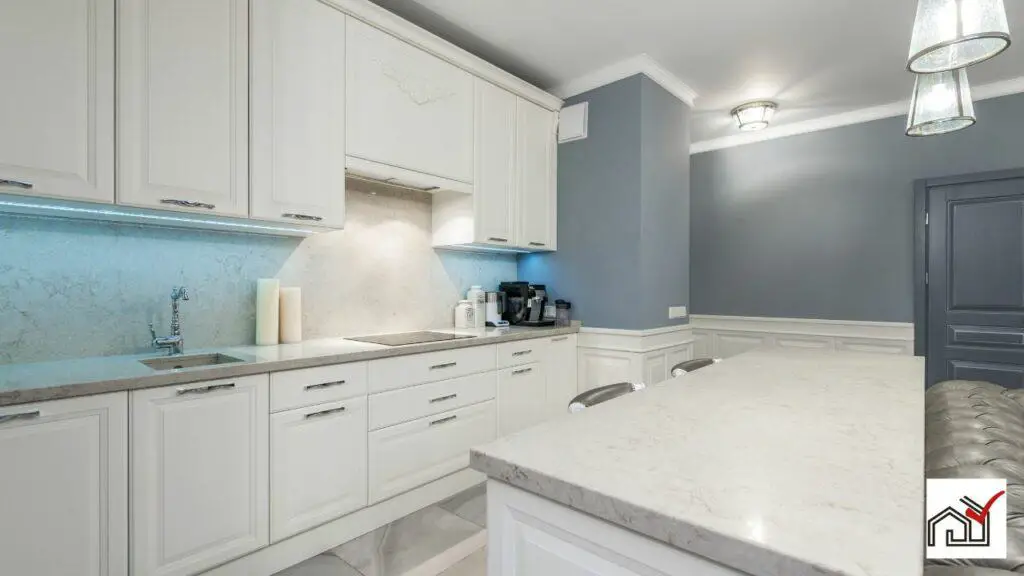Granite countertops are great investments that can really transform your kitchen.
But you need to know how to take care of your granite countertops if you are planning to take full advantage of them.
Are you supposed to clean them daily or weekly? Is there any yearly maintenance that you should be aware of?
If these questions sound familiar, then this is the guide for you.
In this guide, we will cover the daily, weekly, yearly, and occasional care required to keep granite countertops looking great for years to come.
So let’s get started.
Everyday Care
When it comes to taking care of your granite countertop, everyday care is essential to keep it looking new.
For regular cleaning of the granite countertop, a dry microfiber cloth is enough to eliminate any dust from the surface.
For more thorough cleaning, you will need to use warm water and mild dishwashing soap.
This will help remove any spills or messes. It will also provide antibacterial properties due to the use of dishwashing soap.
If germs are an issue, mix four tablespoons of isopropyl alcohol with four drops of dishwashing soap in a spray bottle filled with warm water.
Then, spray this mixture on the countertop and wipe it down with a clean, soft cloth.
If more intense deep cleaning is needed, use a stone cleaner with a neutral pH that is specifically designed for granite countertops.
Don’t use abrasive cleaners or harsh chemicals on the granite countertop because they can damage the surface.
Too much sunlight can also cause the granite countertop to deteriorate.
So it’s advisable to close the blinds to protect parts of the countertop that receive direct sunlight.
Weekly Care
To keep your granite countertop looking new, it’s important to give it weekly care.
Start off with a damp cloth and a commercial stone cleaner formulated with a neutral pH.
Cleaners that are specifically manufactured for granite are ideal.
Natural cleaning products can also be used safely on the granite countertop surface.
However, please read the manufacturer’s instructions thoroughly before using them.
Avoid using household acids such as vinegar, lemon, lime, citrus, etc. These can etch the surface of your granite countertop.
Also, stay away from ammonia or ammonia-based cleaners such as Windex.
Bleach will also degrade the finish of your countertop if it’s used at full strength.
You will have to dilute the bleach if you really want to use it.
You should also avoid steel wool, scrubby sponges, and disinfecting wipes because they are too abrasive for granite.
If you avoid using these ingredients regularly, you will find that your granite countertop won’t etch and dull as quickly, and its sealant will also last longer.
Yearly Care
One key part of taking care of a granite countertop is examining it once a year and re-sealing it if necessary.
Sealing granite creates a nonporous finish that helps protect it against stains.
White granite countertops must be sealed more often than dark-colored ones because they are more prone to staining.
The most reliable way to know if it’s time for re-sealing is to do what we call the Water Test.
Splash a little bit of water on the countertop’s surface and watch how it behaves.
If the water beads up, then you don’t need to re-seal it yet. But if the water gets absorbed, then it’s time for another coat of sealant.
Make sure that you perform this test on countertop areas that get used the most.
To apply a sealer, first make sure that the countertop is clean and dry.
Then apply a sealant layer with a cloth by following the directions on the sealer container.
Wait for the layer to dry up thoroughly before applying another coat.
Once finished, wait for 24 hours before using your countertop so that the sealer has enough time to cure properly.
However, note that not all granite countertops need to be sealed every year.
There is no exact timeline set in stone for re-sealing granite countertops.
You can generally tell when it’s time to re-seal your countertop by checking whether the water around the sink is getting absorbed.
This is a sure sign that re-sealing is required.
Coming to countertop finishes, polished finishes are the most popular choice for granite countertops.
However, it’s also important to keep other finishes in mind, such as honed or leathered.
These granite countertop finishes are more absorbent than a polished finish.
So applying a penetrating sealant is recommended in order to protect them from stains, bacteria, and moisture.
However, even after proper sealing, these finishes on black granite countertops may still show marks or discoloration when wet.
There is no reason to panic because these marks usually go away once the countertop surface dries up.
Occasional Care – Removing Stains from Granite Countertops

Granite countertops need occasional care, whether it’s to avoid staining or remove the stains that have occurred over time.
As a preventive measure, wipe away any spills on the countertop as soon as possible.
Never let any liquid sit on the granite countertop overnight.
Oil, in particular, can stain your granite countertop if allowed to sit for too long.
That’s why it’s not a good idea to place pots and pans with oil traces directly on the surface of your granite countertop.
In case of an oil stain, quickly blot it up with a damp cloth and use mild soap and warm water to cleanse the area.
If more stubborn stains remain despite these precautions, here’s a special cleaning procedure you can use.
Make a paste out of baby or baking soda combined with some water.
Moisten the countertop stained area and apply about half an inch thick layer of the paste on it.
Then, cover the area with a plastic sheet and let it sit for 48 hours.
Once the time is up, scrape off the paste and rinse the countertop area with clean water.
Wipe off excess water and allow the surface to dry completely.
For the most stubborn stains that won’t come out, try using a straight razor blade in a gentle scraping motion.
You can also use dry steel wool grade 00.
For any water-based stains that occur on your countertop, mix baking soda and hydrogen peroxide and follow the steps mentioned above for oil-based stains.
Precautions to Take While Using Granite Countertops
Taking care of your granite countertop is always a good thing.
However, it’s always better to take precautions in order to reduce your maintenance work later on.
Here are some precautions to take while you work on your granite countertops.
1. Handle Heavy Items with Care
When you have a granite countertop, one of the main precautions you can take is to handle heavy items with care.
Generally, a granite countertop isn’t prone to chipping.
But it can chip because of heavy items banging on the edge of the countertop.
So if you are handling anything that’s bulky and heavy, be extra cautious while you are near your granite countertop.
However, if a chip occurs, find and keep the broken piece because it can usually be epoxied back into place.
2. Don’t Use Sharp Objects
While granite is scratch-resistant, it’s still a good idea to exercise caution while using sharp objects on a granite countertop.
For instance, when cutting vegetables on a granite countertop, it’s highly advisable to use an actual cutting board.
This will help avoid any chances of scratches and keep your countertop looking its best for years to come.
Related: Pros and Cons of 15 Popular Granite Countertop Edges | Ways to Lower Granite Countertop Cost
3. Avoid Placing Drinks Directly on The Countertop
You should try and avoid placing drinks directly on the granite countertop.
While granite is remarkably resistant to stains compared to other countertop materials, it’s best not to risk leaving a mark on your new granite countertop.
Put a coaster beneath your drinks while setting them on the counter.
This simple technique will help you protect your granite countertop from any potential stains.
Making sure your granite countertops look beautiful for years to come doesn’t need to be complicated—just keep things simple and safe.



